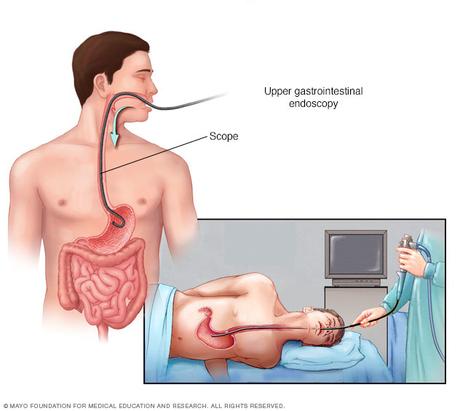- abdominal pains and burning sensations, including bloating (especially after eating and between the belly and breastbone)
- bleeding when vomiting or going to the bathroom
- nausea and vomiting
- darker stools
- loss of appetite and changes in body weight
- trouble sleeping due to pain
- other digestive complaints like heartburn, acid reflux, feeling gassy
- the risk for perforation of the organ lining (a life-threatening condition requiring emergency surgery to repair small openings in the lining of the GI tract)
- dehydration, weakness and fatigue (if food intake is changed in response to pain when eating)
- diarrhea can occur as a symptom even before other stomach ulcer symptoms start
Diagnosis
In order to detect an ulcer, your doctor may first take a medical history and perform a physical exam. You then may need to undergo diagnostic tests, such as:- Laboratory tests for H. pylori. Your doctor may recommend tests to determine whether the bacterium H. pylori is present in your body. He or she may look for H. pylori using a blood, stool or breath test. The breath test is the most accurate. Blood tests are generally inaccurate and should not be routinely used.For the breath test, you drink or eat something containing radioactive carbon. H. pylori breaks down the substance in your stomach. Later, you blow into a bag, which is then sealed. If you're infected with H. pylori, your breath sample will contain the radioactive carbon in the form of carbon dioxide.If you are taking an antacid prior to the testing for H. pylori, make sure to let your doctor know. Depending on which test is used, you may need to discontinue the medication for a period of time because antacids can lead to false-negative results.
- Endoscopy. Your doctor may use a scope to examine your upper digestive system (endoscopy). During endoscopy, your doctor passes a hollow tube equipped with a lens (endoscope) down your throat and into your esophagus, stomach and small intestine. Using the endoscope, your doctor looks for ulcers. If your doctor detects an ulcer, small tissue samples (biopsy) may be removed for examination in a lab. A biopsy can also identify whether H. pylori is in your stomach lining.Your doctor is more likely to recommend endoscopy if you are older, have signs of bleeding, or have experienced recent weight loss or difficulty eating and swallowing. If the endoscopy shows an ulcer in your stomach, a follow-up endoscopy should be performed after treatment to show that it has healed, even if your symptoms improve.
- Upper gastrointestinal series. Sometimes called a barium swallow, this series of X-rays of your upper digestive system creates images of your esophagus, stomach and small intestine. During the X-ray, you swallow a white liquid (containing barium) that coats your digestive tract and makes an ulcer more visible.
Treatment
Treatment for peptic ulcers depends on the cause. Usually treatment will involve killing the H. pylori bacterium, if present, eliminating or reducing use of aspirin and similar pain medications, if possible, and helping your ulcer to heal with medication.Medications can include:- Antibiotic medications to kill H. pylori. If H. pylori is found in your digestive tract, your doctor may recommend a combination of antibiotics to kill the bacterium. These may include amoxicillin (Amoxil), clarithromycin (Biaxin), metronidazole (Flagyl), tinidazole (Tindamax), tetracycline (Tetracycline HCL) and levofloxacin (Levaquin).The antibiotics used will be determined by where you live and current antibiotic resistance rates. You'll likely need to take antibiotics for two weeks, as well as additional medications to reduce stomach acid, including a proton pump inhibitor and possibly bismuth subsalicylate (Pepto-Bismol).
- Medications that block acid production and promote healing. Proton pump inhibitors — also called PPIs — reduce stomach acid by blocking the action of the parts of cells that produce acid. These drugs include the prescription and over-the-counter medications omeprazole (Prilosec), lansoprazole (Prevacid), rabeprazole (Aciphex), esomeprazole (Nexium) and pantoprazole (Protonix).Long-term use of proton pump inhibitors, particularly at high doses, may increase your risk of hip, wrist and spine fracture. Ask your doctor whether a calcium supplement may reduce this risk.
- Medications to reduce acid production. Acid blockers — also called histamine (H-2) blockers — reduce the amount of stomach acid released into your digestive tract, which relieves ulcer pain and encourages healing. Available by prescription or over-the-counter, acid blockers include the medications ranitidine (Zantac), famotidine (Pepcid), cimetidine (Tagamet HB) and nizatidine (Axid AR).
- Antacids that neutralize stomach acid. Your doctor may include an antacid in your drug regimen. Antacids neutralize existing stomach acid and can provide rapid pain relief. Side effects can include constipation or diarrhea, depending on the main ingredients.Antacids can provide symptom relief, but generally aren't used to heal your ulcer.
- Medications that protect the lining of your stomach and small intestine. In some cases, your doctor may prescribe medications called cytoprotective agents that help protect the tissues that line your stomach and small intestine.Options include the prescription medications sucralfate (Carafate) and misoprostol (Cytotec).
Follow-up after initial treatment
Treatment for peptic ulcers is often successful, leading to ulcer healing. But if your symptoms are severe or if they continue despite treatment, your doctor may recommend endoscopy to rule out other possible causes for your symptoms.If an ulcer is detected during endoscopy, your doctor may recommend another endoscopy after your treatment to make sure your ulcer has healed. Ask your doctor whether you should undergo follow-up tests after your treatment.Ulcers that fail to heal
Peptic ulcers that don't heal with treatment are called refractory ulcers. There are many reasons why an ulcer may fail to heal, including:- Not taking medications according to directions
- The fact that some types of H. pylori are resistant to antibiotics
- Regular use of tobacco
- Regular use of pain relievers — including aspirin, ibuprofen (Advil, Motrin, others) and naproxen sodium (Aleve, Anaprox, others) — that increase the risk of ulcers
- Extreme overproduction of stomach acid, such as occurs in Zollinger-Ellison syndrome
- An infection other than H. pylori
- Stomach cancer
- Other diseases that may cause ulcer-like sores in the stomach and small intestine, such as Crohn's disease
Lifestyle and home remedies
You may find relief from the pain of a stomach ulcer if you:- Choose a healthy diet. Choose a healthy diet full of fruits, especially with vitamins A and C, vegetables, and whole grains. Not eating vitamin-rich foods may make it difficult for your body to heal your ulcer.
- Consider foods containing probiotics. These include yogurt, aged cheeses, miso, and sauerkraut.
- Consider eliminating milk. Sometimes drinking milk will make your ulcer pain better, but then later cause excess acid, which increases pain. Talk to your doctor about drinking milk.
- Consider switching pain relievers. If you use pain relievers regularly, ask your doctor whether acetaminophen (Tylenol, others) may be an option for you.
- Control stress. Stress may worsen the signs and symptoms of a peptic ulcer. Consider the sources of your stress and do what you can to address the causes. Some stress is unavoidable, but you can learn to cope with stress with exercise, spending time with friends or writing in a journal.
- Don't smoke. Smoking may interfere with the protective lining of the stomach, making your stomach more susceptible to the development of an ulcer. Smoking also increases stomach acid.
- Limit or avoid alcohol. Excessive use of alcohol can irritate and erode the mucous lining in your stomach and intestines, causing inflammation and bleeding.
- Try to get enough sleep. Sleep can help your immune system, and therefore counter stress. Also, avoid eating shortly before bedtime.


